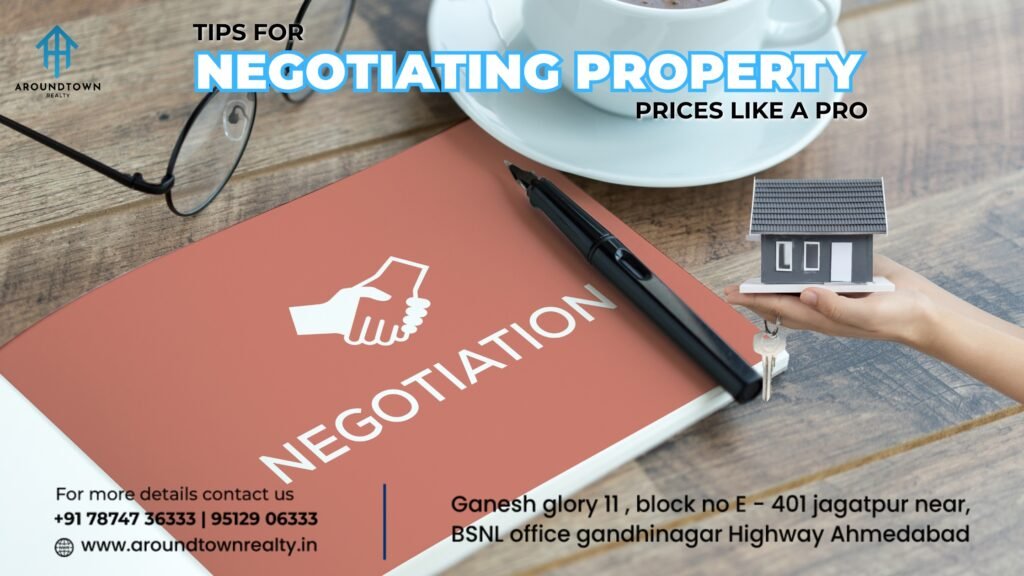Negotiating property prices is a critical skill every homebuyer or investor should master. Whether you’re purchasing your first home, looking to invest in real estate, or upgrading to a larger property, getting the best possible deal can save you thousands. Understanding how to negotiate property prices effectively can not only help you secure a property within your budget but also ensure that you’re making a sound financial investment.
In real estate, negotiations can make a huge difference in the final purchase price, and with the right strategy, you can gain significant leverage. In this detailed guide, we will walk you through expert strategies and techniques to help you negotiate property prices like a seasoned pro. By following these steps, you can confidently approach your next property purchase, armed with the knowledge to get the best deal possible.
Why Negotiation Skills Matter in Real Estate
Real estate markets can fluctuate, but one thing remains constant: the ability to negotiate directly impacts the value you get for your money. Whether the market is a buyer’s or seller’s market, successful negotiations can save you thousands of rupees and ensure that you’re not overpaying for a property.
If you’re buying in a competitive market, negotiation could be the key to securing the property without bidding too high. On the other hand, in a buyer’s market, you might have more leverage, making it an excellent opportunity to get a better price.
Step 1: Do Thorough Market Research
Before you even consider entering a negotiation, it’s vital to do your homework. Understanding the market value of the property and similar properties in the area will give you a solid foundation for your negotiation.
- Analyze Similar Properties: Look at the sale prices of comparable properties in the area, especially those that have recently sold. Websites like Magicbricks, 99acres, and Housing can help you get a clear sense of market pricing.
- Consider the Property’s History: Understand how long the property has been on the market. If a property has been listed for a long time, the seller might be more willing to negotiate.
- Check Local Market Trends: Understand whether property values are rising or falling in the neighborhood. If it’s a growing area, sellers may hold firm on price. However, if values are stagnant or declining, you may have more room for negotiation.
Step 2: Get Pre-approved for a Loan
Having pre-approval for a home loan not only helps you understand your budget but also positions you as a serious buyer in the eyes of the seller. Sellers are more likely to engage in negotiations when they see that you are financially prepared.
When you’re pre-approved, you also know the upper limit of your borrowing capacity. This allows you to stay within your budget during the negotiation process and avoid overextending yourself.
Step 3: Know the Seller’s Motivation
Understanding the seller’s motivation can give you valuable insights into how much room you have for negotiating the price. There are several scenarios that could affect a seller’s willingness to negotiate:
- Time-sensitive Sellers: If the seller is relocating for a job, has already purchased another home, or needs to sell quickly for personal reasons, they may be more motivated to negotiate.
- Distressed Sellers: Sellers who are financially distressed or facing foreclosure may also be more inclined to accept a lower offer.
- Seller’s Market vs. Buyer’s Market: In a seller’s market, the seller has more leverage, so negotiations might be tougher. In a buyer’s market, where supply exceeds demand, you have a better chance to negotiate a lower price.
Understanding these motivations will help you tailor your approach during the negotiation process.
Step 4: Make the First Offer
In negotiations, it’s generally better to make the first offer, as it sets the tone for the rest of the discussion. Your first offer should be lower than your actual target price but still reasonable based on your research. By offering lower initially, you leave room for counteroffers while ensuring you still end up with a good deal.
For example, if the listed price of a property is ₹90 lakh and similar properties in the area are selling for around ₹85 lakh, you could start with an offer of ₹82 lakh. This way, even if the seller counters with ₹86 lakh or ₹87 lakh, you’re still within your target price range.
Step 5: Understand the Art of Counteroffers
Counteroffers are an essential part of the negotiation process. When a seller responds to your initial offer, you must evaluate their response carefully. Don’t rush to accept the first counteroffer you get.
- Evaluate the Seller’s Response: If the seller comes back with a price higher than you expected, don’t accept it immediately. Consider the reasons behind the increase (market conditions, property upgrades, etc.).
- Negotiate in Increments: When making counteroffers, try to negotiate in small increments. For example, if you’ve offered ₹82 lakh, and the seller counters with ₹88 lakh, you can respond with ₹83 lakh or ₹84 lakh. By doing this, you’re showing flexibility but still keeping the price within your expectations.
- Don’t Get Emotionally Attached: It’s easy to fall in love with a property, but getting emotionally attached can hurt your ability to negotiate effectively. Stay objective, and don’t let feelings influence your decision-making.
Step 6: Be Willing to Walk Away
One of the most powerful negotiation tools is the ability to walk away. If the price doesn’t meet your expectations or your budget, be prepared to leave the deal behind.
While walking away can be tough, it signals to the seller that you’re serious about your limits and won’t accept just any price. Sometimes, this can prompt the seller to come back to you with a better offer.
Step 7: Negotiate Beyond the Price
In some cases, the seller may not be willing to reduce the price significantly. However, there are many other aspects of the deal that you can negotiate:
- Closing Costs: If the seller is firm on the price, you could ask them to cover some of the closing costs.
- Repairs and Upgrades: If the property needs repairs or updates, you can negotiate for the seller to either make those repairs or give you a credit towards future repairs.
- Move-in Date: Sometimes, the timing of the move can be negotiated, allowing you to choose a date that works better for your schedule.
- Appliances and Furnishings: If the seller is willing to leave behind appliances, furniture, or other items, use this as a bargaining chip.
YOU MIGHT ALSO READ THIS: How to Negotiate the Best Price When Buying a Property in Ahmedabad
Step 8: Use Professional Help If Needed
Negotiating property prices can be complex, and you may not always feel comfortable handling it alone. Working with a trusted real estate agent or consultant like Around Town Realty can help you navigate negotiations. A professional agent has experience in negotiations and can provide valuable insights based on their knowledge of the local market.
An expert from Around Town Realty can help you:
- Make informed decisions based on market research
- Represent your best interests during negotiations
- Advise on when to push and when to be flexible
Step 9: Finalize the Agreement
Once you’ve agreed on the price, it’s time to put everything in writing. This will be part of your sale agreement, which outlines the terms and conditions of the purchase. Ensure that all agreed-upon points, such as repairs, closing costs, and move-in dates, are included in the agreement.
Before signing, have a lawyer review the document to ensure everything is in order. Once all parties have signed the agreement, the deal is officially closed.
Conclusion: Choose ATR for Your Next Property Purchase
Negotiating property prices can be tricky, but with the right strategies and mindset, you can ensure that you’re getting the best deal possible. Whether you’re a first-time buyer or an experienced investor, effective negotiation skills are essential for saving money and making a wise investment.
If you’re looking to purchase a property in Ahmedabad, trust AroundTown Realty to help you navigate the buying process. Our experts can guide you through negotiations, ensuring you secure the property of your dreams at the best possible price. Contact us today to start your property journey.
FAQs: Negotiating Property Prices
- How do I know if I’m negotiating the right price for a property?
Research the local market, look at comparable properties, and consider factors like the property’s condition and how long it has been on the market. If you’re unsure, consulting with a real estate agent or professional can help. - Should I make the first offer in a negotiation?
Yes, it’s often better to make the first offer to establish the initial price point and leave room for counteroffers. Make sure the offer is reasonable and based on market research. - What if the seller refuses to lower the price?
If the seller is firm on the price, try negotiating other aspects of the deal, such as asking for the seller to cover closing costs or provide repair credits. - How do I know when to walk away from a deal?
If the price is beyond your budget, or if the seller is not willing to meet your terms or expectations, it may be time to walk away. Be prepared to move on to other properties. - How can Around Town Realty help me with negotiations?
At Around Town Realty, our experts are experienced negotiators who can help you secure the best price and guide you through the entire buying process. Contact us today to get started.









